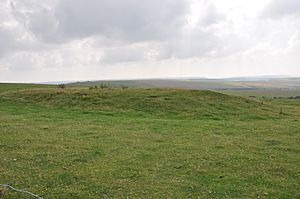Firle Beacon facts for kids
Firle Beacon is a tall hill located in the beautiful South Downs area of southern England. It stands 217 metres (about 712 feet) high. This makes it a "Marilyn," which is a special term for a hill that is at least 150 metres (about 492 feet) higher than the land around it. From the top, you can see amazing views far into the distance.
When the wind blows from the north, Firle Beacon is a popular spot for gliding and paragliding. People use the wind to stay in the air, soaring like birds!
Ancient Burial Mounds
Around Firle Beacon, you can find several ancient burial mounds. These mounds are called "barrows." They were built a very long time ago by people who lived in this area.
Long Barrows
One type is a long barrow. These are long, raised earth mounds. The long barrow near Firle Beacon was built during the Neolithic period. This was the New Stone Age, about 4,500 to 2,500 BC.
The long barrow west of Firle Beacon is about 34 metres (112 feet) long. It is also about 21 metres (70 feet) wide and 2.6 metres (8.5 feet) high. It runs from east to west and has a ditch around it. This ditch is easier to see on the northern side.
Round Barrows
There are also several round barrows. These are circular mounds of earth. Most round barrows were built during the Bronze Age, which was from about 2,500 BC to 800 BC.
Right at Firle Beacon, there is a round barrow called a "bowl barrow." It is about 18 metres (60 feet) across and 1 metre (3.5 feet) high. In 1820, people explored this barrow. They found two cremation urns inside. These urns would have held the ashes of people who died long ago. Other round barrows are also found within a kilometre of Firle Beacon.
The Mystery of Firle Corn
50°49′59″N 0°06′00″E / 50.833°N 0.100°E High up on the north-east side of Firle Beacon is something called "Firle Corn." This is a very old and almost invisible hill figure. Hill figures are huge shapes cut into the side of a hill. Firle Corn looks a bit like a small ear of corn. However, no one is really sure what it is meant to be.
Some people think it might be a type of gigantotomy. This means it could be a giant figure cut into the hill. There's an old legend about a giant named Gill who was supposedly cut into this hill. This giant was thought to be an enemy of the Long Man of Wilmington, another famous hill figure nearby. One story says that the Firle Beacon giant threw his hammer at the Wilmington giant and killed him. The Firle Corn figure might mark this legendary spot.
 | Aaron Henry |
 | T. R. M. Howard |
 | Jesse Jackson |


